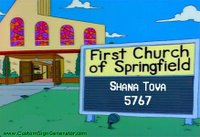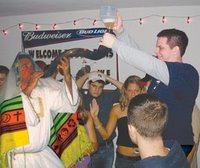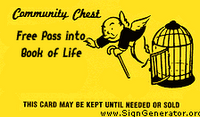This week I submit to you a relatively brief (relative to other High Holiday sermons), particularly because I both begin to write it and post it a day-and-a-half before the New Year. Also, I am quite distracted by a 4 hour movie I’m watching as I write this so this may not be as collected as usual, maybe accurately called a collection. My intention is not a modern High Holiday sermon that speaks to us today, but an archaic firebrand that should speak to us today. This High Holiday sermon will suggest some sort of folly, or, to the contrary, glory in man, the fleetingness of life, and something that may cause paranoia. Perhaps this is disorganized, perhaps this is merely a collection of stories that inspire appropriate feelings for the awesomeness of this time of year. Perhaps this is because I am very distracted. To keep you distracted, I present funny pictures.

The Talmud suggests a person keep two inscriptions with them at all times. One of the inscriptions reads "בשבילי נברא העולם", “for me the world was created”. The world came into existence for you, because of you and you alone. Everyone is part of your dream. I whisper this in the ears of each of my students at camp and a smile crosses their faces.
However, the first phrase left unchecked can lead to brash arrogance. It has a fool, coined by Abraham, "ואנכי עפר ואפר" “I am only dust and earth”. When one whispers to ones students after handing them a piece of paper with this verse inscribed on it, in a calming tone “you’re gonna die” they’re not so happy. Being confronted by this mortality brings one crashing back down to the earth. At the same time we are both the sole purpose of creation and a limited-time edition. The value of this short life is therefore maximal. One hour in this physical world is better than eternity in The World To Come; the Jewish concept of Afterlife is paradise but pales in comparison to the here and now. Therefore one must make the most of the little time they have here. Carpe diem!
 A famous parable about King Solomon who was the most intelligent man who ever lived: He had an equally clever, however uneducated, servant who perfectly served his master and got him whatever he wanted. His servant was perfect and because of this, the wise king was jealous. He decided to give the servant an impossible task: in a year’s time he must present the king with something that will make him sad when he is happy and happy when he is sad. The servant searched far and wide, throughout Solomon’s kingdom from The Lebanon to Eilat, from Philistia to Moab and beyond and could not find anything. Returning at the end of the year to the capital, Jerusalem, dejected, he came across a small shop in the market. He asked this same question that he had asked shopkeepers throughout the land for the last year. Instead of laughing the servant out of the shop as all of the others had done, the shopkeeper thought for a moment and presented a simple ring with an engraving. He couldn’t see what was special about this ring, but he had no choice, the deadline was tonight. He returned to the palace to find a banquet underway; the powerful king had decided to publicly humiliate him cementing a major level of difference between master and servant once-and-for-all. The smile was vast on the face of King Solomon as his servant nervously approached. The servant presented the king with the ring. The king, still smiling as he placed the trinket on his finger, gazed upon it and began to cry uncontrollably for many minutes. Calming down a little, he looked again and began to laugh. As it turns out, the ring contained the phrase "גם זה יעבור", “this too shall pass”. I mentioned for the last two weeks that in the choice of life, death, good, and evil, we are to choose life. There are bad times that will transition to good times and vice versa and are all part of life. There are times when we feel that the world was created especially for us and the times that we feel we are but the dust of the earth. The Yizkor Memorial service traditionally begins with a couple of lines
A famous parable about King Solomon who was the most intelligent man who ever lived: He had an equally clever, however uneducated, servant who perfectly served his master and got him whatever he wanted. His servant was perfect and because of this, the wise king was jealous. He decided to give the servant an impossible task: in a year’s time he must present the king with something that will make him sad when he is happy and happy when he is sad. The servant searched far and wide, throughout Solomon’s kingdom from The Lebanon to Eilat, from Philistia to Moab and beyond and could not find anything. Returning at the end of the year to the capital, Jerusalem, dejected, he came across a small shop in the market. He asked this same question that he had asked shopkeepers throughout the land for the last year. Instead of laughing the servant out of the shop as all of the others had done, the shopkeeper thought for a moment and presented a simple ring with an engraving. He couldn’t see what was special about this ring, but he had no choice, the deadline was tonight. He returned to the palace to find a banquet underway; the powerful king had decided to publicly humiliate him cementing a major level of difference between master and servant once-and-for-all. The smile was vast on the face of King Solomon as his servant nervously approached. The servant presented the king with the ring. The king, still smiling as he placed the trinket on his finger, gazed upon it and began to cry uncontrollably for many minutes. Calming down a little, he looked again and began to laugh. As it turns out, the ring contained the phrase "גם זה יעבור", “this too shall pass”. I mentioned for the last two weeks that in the choice of life, death, good, and evil, we are to choose life. There are bad times that will transition to good times and vice versa and are all part of life. There are times when we feel that the world was created especially for us and the times that we feel we are but the dust of the earth. The Yizkor Memorial service traditionally begins with a couple of lines
ה' מה אדם ותדעהו, בן-אנוש ותחשבהו
אדם להבל דמה, ימיו כצל עובר
מה-אנוש כי-תזכרנו ובן-אדם כי תפקדנו
ותחסרהו מעט מאלהים וכבוד והדר תעטרהו
The Silverman Machzor translates these four lines as the following:
“O Lord, what is man that Thou takest knowledge of him? Or the son of man that Thou doest regard him? Man is like unto a breath; His days are as a shadow that passes away. O Lord what is man that thou art mindful of him? And the son of man that Thou thinkest of him? Yet thou hast made him but little lower than the angels, And hast crowned him with glory and honor.”
 So what does this all mean in being a member of the Chosen People. As Private Detective Adrian Monk would say “it’s a gift… and a curse”. We as Jews have a special relationship with God, as is, I’m sure many other religions do. However, we are Yisrael, named after a man whose new name is sort of an acronym meaning “he who fights with gods and men and is victorious”. We are not a submissive religion. Islam literally means submission to God. When Abraham says his aforementioned phrase, he is in the midst of an argument with God over the inhabitants of Sodom and Gomorrah. Abraham, like all people, has been endowed with a free will. Rabbi Akiba says in the third chapter of Pirkei Avot, the Lessons of our Sages: "הכל צפוי, והרשות נתונה", “though all is foretold, free will is given”. This allows for humanity to be as wonderful or indeed, as evil, as it wants to be without it being controlled by a higher power. However, there still is the matter of answering for our actions. Jews, as close as they are to God are constantly known as a stiffnecked people which has stubbornly gotten us into trouble for staying the course but has also kept us alive as a people.
So what does this all mean in being a member of the Chosen People. As Private Detective Adrian Monk would say “it’s a gift… and a curse”. We as Jews have a special relationship with God, as is, I’m sure many other religions do. However, we are Yisrael, named after a man whose new name is sort of an acronym meaning “he who fights with gods and men and is victorious”. We are not a submissive religion. Islam literally means submission to God. When Abraham says his aforementioned phrase, he is in the midst of an argument with God over the inhabitants of Sodom and Gomorrah. Abraham, like all people, has been endowed with a free will. Rabbi Akiba says in the third chapter of Pirkei Avot, the Lessons of our Sages: "הכל צפוי, והרשות נתונה", “though all is foretold, free will is given”. This allows for humanity to be as wonderful or indeed, as evil, as it wants to be without it being controlled by a higher power. However, there still is the matter of answering for our actions. Jews, as close as they are to God are constantly known as a stiffnecked people which has stubbornly gotten us into trouble for staying the course but has also kept us alive as a people. Which is worse, a robber or a burglar? It may seem a redundant question, both steal, and the only difference is time. A robber steals during daylight, a burglar at night. From this we can infer that the robber is fearless of their fellow mortals, stealing right in front of people. The fact that the burglar steals at and into the night suggests that they are afraid of people and will therefore employ the stealth of night to get past then. But the burglar is worse because they fear man but not God. One of the most important characteristics of a “good Jew” is יראת שמים, awe of heaven, fear of God.
It is important to have that Almighty chip on your shoulder. A kippa sits on my head not out of any Biblical or Talmudic halacha that I know, but as a symbol, a hat which not only reminds me that I’m a Jew and a representative of the Chosen People, but it also tells everyone else that. I’m not about to walk into a pornography store or a McDonalds if I have my trusty yarmulke on my head. It would beמראת עין (maras ayin), as we would say in Yiddish, a shande for the goyim. The purpose of the tzitzit strings on the tallit are to act as reminders to do mitzvot. Indeed there is more expected from us than of other peoples. Talk of “disproportionate response” is disproportionately thrust upon Israel even though she shows disproportionate restraint. Judaism is prized for its morality and equity. Jews can’t be robbers (“what would the goyim think?!”) or burglars (and let God see us misbehaving?!”). Instead we must do right in the eyes of both God and man.
During these Ten Days of Repentance the word El (“God”) becomes Melech (“King”) in many of our prayers. We refer constantly to God as King. I’m Baal Shacharit, the leader of the morning service at my synagogue on the High Holidays and the first word in the service I chant is "המלך!" “The King!” Many assume that God becomes even more lofty during this time of the year sitting in judgment. I dissent and say that, au contraire, we ascend to greater heights. Like Rabbi Ishmael in the Yom Kippur Martyrology known as אלה אזכרה, we are able to ascend heavenward. The relationship with a god is ethereal and disconnected. A god answers to nobody and there are no consequences for the god’s whims. A king, by title, is a royal representative and even an absolute king is somewhat accountable to his people. We have the ability to show the King our “A-Game” this week and write ourselves in for a year of goodness, of health, of success, of sweetness, of redemption, of love, of peace. May we be inscribed in such a book.
לשנה טובה תכתיבו ותחתימו
 PS: Anyone feeling lucky should consider joining my facebook group
PS: Anyone feeling lucky should consider joining my facebook group People who already know they've been written in the Book of Life 5767
No comments:
Post a Comment